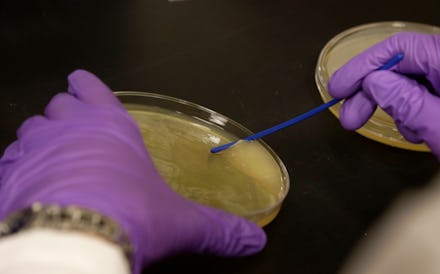New Study Finds Unlikely Beneficiaries of Drug Testing: Black Men

Here's something you don't hear every day: Drug-testing actually raises the wages of some employees, namely black men.
Such are the results of a National Bureau of Economic Research study published last week, which reveal not only an unlikely racial legacy of America's War on Drugs, but also the economic consequences of misinformation about black male drug use.
In the late 1980s when the fight against drugs was escalating, states enacted various policies surrounding workplace testing. Fourteen states, mostly in the South and Midwest, adopted laws to enforce testing by offering legal and financial incentives to companies that test current and prospective employees. Seven states, mostly in the Northeast and West, developed laws to explicitly limit testing. Twenty-nine states made little or no significant changes.
Notre Dame University economist Abigail Wozniak studied the impact of those laws on African-American employment between 1980 and 2010. Her findings reveal that low-skilled black men were significantly impacted by the pro-drug test laws. Their wages in states that tested rose 12% more than black employees in states opposed to testing and 4% more than in the "neutral" states.
So what's going on? The overall employment rate of black men in pro-testing states didn't change, Wozniak told PolicyMic. Instead, it shifted from worse jobs into better ones.
The firms most likely to test employees are bigger, pay better and offer more benefits than firms that don't test. Many of the companies that require drug tests are in industries like transportation, government, mining and utilities.
"These pro-testing firms hired more blacks and paid more," said Wozniak.
However, the effects of drug testing are not universally positive. They have negative effects for women, whereby the employment rate of women in these industries fell 1.5%. There was no measurable impact on Hispanics.
So why would testing employees for drug use have any change on their employment and wages? Because, according to Wozniak, American companies had unfounded assumptions about black people's drug use.
But, here's the truth about drug use: Rates of drug use among blacks and whites are nearly identical. Between 1990 and 2006, 13% percent of African-Americans and 14% of whites reported using drugs over the course of a month, according to the the National Survey on Drug Use and Health (NSDUH).
Her research doesn't answer whether firms over-estimated drug use among blacks, or under-estimated drug use among whites and women. That firms hired more black employees after drug testing reflects that black applicants were unfairly discriminated against.
More consequential for their employment opportunities, however, is the bias among hiring managers, who are more likely to believe that African-Americans will fail drug tests than their white counterparts, according to Wozniak's 2011 study in the American Journal of Economics and Sociology.
It is clear that now more than ever, those perceptions matter. Firms' hiring biases emerge in the trends that show they hire fewer blacks in place of, as the study suggests, white women. Such testing allows black employees and job applicants to disprove those costly and misplaced biases.